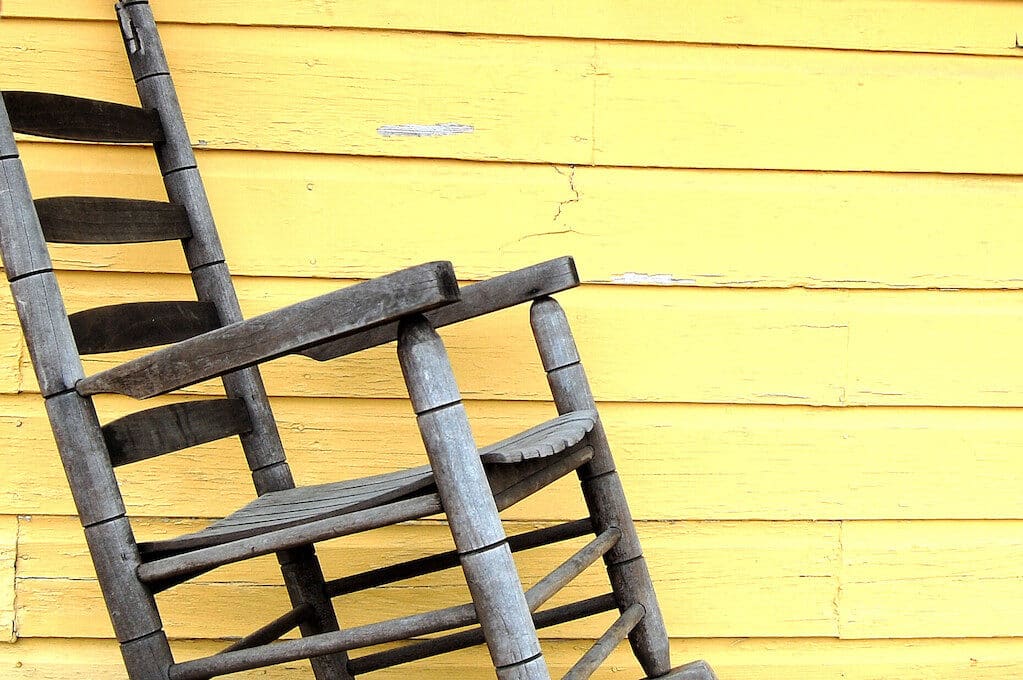No one don’t never sit in that chair. Not though every other chair in the house is taken. Sitting on the floor rather than sitting in that chair. It’s understood. Been like that for years, long enough that memory should have lost the reason why. And yet no one sits there.
Then there’s a man in my life again and his words are all honey and sweet, as they are when a man wants something. And he pulls the stars from the sky for me and a saddle he throws over the moon. His hands are clumsy beneath my skirt and his breath quick and hot on my cheek, and he says he loves me, dares as much. I laugh when he says it, but I let him into my bed, and together we banish sleep.
Because of that, he thinks he is important to me and that he has some special place in the house. I stroke his hair and kiss his lips and this gives him to think he is a man in this house. But then he makes to sit in that chair.
“Please,” I say. “Come sit in this chair.” And I point to one that holds more comfort. It has a high back and wide arms and is like a throne in its splendor. “Please,” I say, but he does not hear the granite in my voice. “Please,” I say again. “Not in that chair.”
He tries to make light of my words, to make nothing of this small and seemingly unreasonable request. A man may sit where he wills, he thinks, and so he brushes aside my “please.”
I am asking as gently as I might and I say again, “Do not sit in that chair.” And he laughs, and I add, “Not if you love me.”
He is a man who can make silence scream, beating against my ears like fists or sticks. He sees my tears and hears me weeping, my breath catching and snatched. He must understand the importance of what I ask him. But he lowers himself into the chair all the same.
I turn against him then, and I spit in his tea when he isn’t looking and fold curses into his bread, all spite and spider; and when he sleeps, I prick his skin with the points of needles, and I whisper in his ears, conjuring devils each night to plague his dreams. In the pocket of his coat one day, I tucked the body of a bird with its neck broke and maggots where birdsong should be, then a purse of snapped bones, and once it was a mouse that I pressed into the dark of his shoe, then salt-strangled slugs into his hands so he finds them when he wakes.
“Not in that chair,” I tell him each day. “Please, not in that chair.”
And soon he is as thin as a ghost and pale, and his hair falls from his head like feathers when a bird is molting, and his voice is all husk and breath and bark. And he moves slow as creeping shadows, every step a hurt as though he walks on hot coals. Half the man he was and should be still, if only he had listened to me.
“Not in that chair.”
And he hears me at last. I think he does, for he asks me then what he should have asked before. He asks me why he must not sit in that chair. His lips give shape to the words, but there is little sound.
Is it not enough that I ask it? Is it not enough that I plead with him day after day? That his sitting there is an agitation in me and that a distance widens between us.
“Do you love me?” I ask him. “For there was a day when you said you did. And you plucked the stars from out of the night and we rode the humpbacked yellow moon till we were breathless and laughing and our laughter woke the eager day. And all I asked for was that you not sit in that chair.”
“It makes no sense,” he says. “It is a chair and it must be what it is.”
And he coughs and there is blood on his dry lips and his eyes are tunnels and his breath comes ever slower and a rattle of sticks in every breath.
“Just tell me why,” he says.
So, I tell him. “It is a dead man’s chair,” I say. Nothing more or less. And I think he understands then, though he does not speak a word to say that he does, nor ever does speak again.
–
Douglas Bruton writes. That makes him a writer. He loves, and so he’s a lover, too. And though he can rustle up a pretty good lasagna, he protests if he’s called a cook. The stories he writes make him wince sometimes, for they dissect love’s broken heart and he never can escape those hurting words. Yet, still, he writes. But the thing is, he loves lasagna and fragrant Thai prawns and Spanish paella, and a part of him thinks if he didn’t write so much he’d be a better cook and love would not be a thing of such harm.
Lead image: “untitled” (via Flickr user Rachael)

